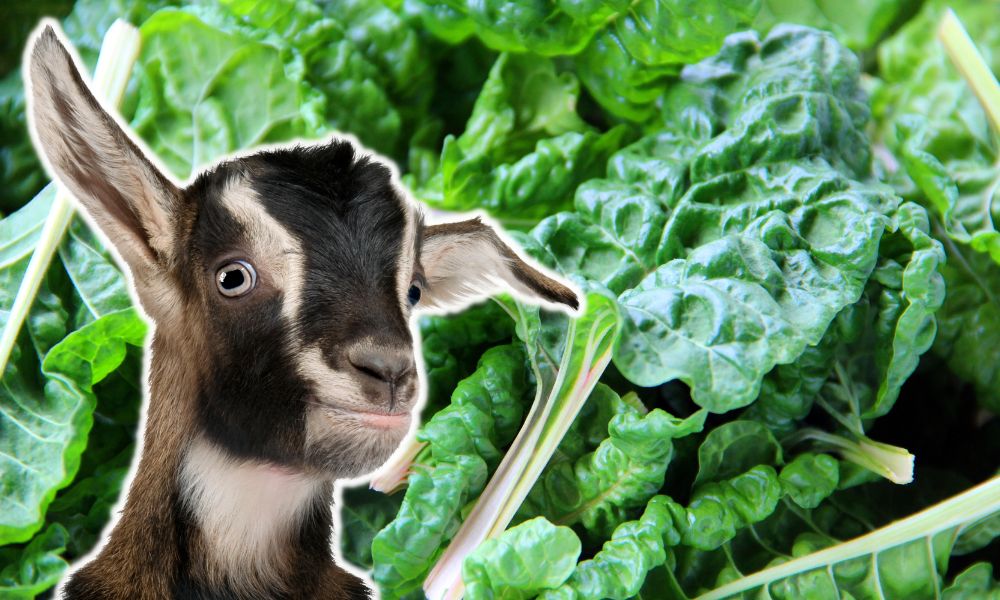Oxalic acid is a problem for many foods and indeed many kinds of animal like goats.
The calcium deficiency it can cause is very real, and has been a problem for goat and horse owners for many years.
While you may not notice any detrimental effect from occasionally feeding them Swiss chard, for their overall health, it is not a good idea in my view.

Is Swiss chard good for goats?
While the overall answer is no, it may be worth pointing out the benefits of Swiss chard—to highlight why you should look elsewhere for such benefits.
The best thing about Swiss chard is the concertation of fiber in those leaves, and indeed the stalks.
Fiber is an essential part of your goat’s diet.
However, that fiber will also be found in just about any other plant or vegetable matter.
Fiber is in pretty much any plant food—so you don’t need to feed them Swiss chard.
Swiss chard is also high in many antioxidants, like vitamin C. Such antioxidants prevent the formation of free radicals in your goat’s body, which damage the cells over time.
A good source of antioxidants is essential.
That said, again, there are countless less risky sources of antioxidants you can give them.
Broccoli or carrots are great examples.
So, while Swiss chard may have elements that are good for goats, these are outweighed by the negatives which many other vegetables of a similar nutrient content do not have.
So, why is Swiss chard bad, then?
Is Swiss chard bad for goats?
Yes, is the simple answer.
The main problem, as I have said, is the concentration of oxalic acid.
This is a common feature of many similar leafy greens, such as spinach and kale.
Oxalates in these plants serve essential functions for the plant, but pose many problems for the goat.
In the digestive system, oxalic acid binds strongly with calcium.
Then, when the oxalic acid is passed, the calcium is passed with it—totally depriving the body of it.
Without calcium being absorbed into the system, your goat will rapidly develop a calcium deficiency.
This can lead to all sorts of illnesses and dangers, including skeletal frailty, muscle fatigue, and many others.
So, there is no understating how dangerous high amounts of Swiss chard could be for your goat.
The fact that you wouldn’t notice it immediately makes it all the more dangerous, as you could easily get into the habit of feeding them Swiss chard without thinking about it.
You might be wondering if there’s a safer way to prepare it—let’s look into that.
Can goats eat raw Swiss chard?
Raw Swiss chard is going to be better in the short term, since it will be more palatable—but it won’t make a difference to the oxalic acid content.
Goats should not eat raw Swiss chard, since it always stands a chance of causing a calcium deficiency down the line.
Raw Swiss chard is likely the kind they would have access to without your intention—say, if you are growing it and they got into the patch, for example.
So, you should treat it as just as dangerous as any other kind.
Can goats eat cooked Swiss chard?
You will probably not be surprised to learn that cooked Swiss chard is no better than raw.
If anything, it is worse—it won’t even be all that palatable to them, once it has lost its crunch and freshness.
It still contains all the oxalic acid, too.
So, no, goats cannot eat cooked Swiss chard—and if it wasn’t clear, there is no way to prepare it that makes it safer.
The one thing that may have some degree of benefit is the stalks.
Can goats eat Swiss chard stalks?
The oxalic acid content in Swiss chard is almost entirely in the leaves—as it is with spinach and kale.
That means that the stalks are considerably safer to eat, though not entirely safe.
If you have leftover stalks after cooking, it may be okay to let your goats have them.
However, make sure there is no leaf remaining on them. For my money, they are still best avoided entirely.
There are plenty of much better and more nutritious things they can eat.
The fact is, then, that the risk is simply far greater than the reward.
There are nutritional benefits to Swiss chard, but they simply are not outweighed by the possibility of calcium deficiency.
Furthermore, anything beneficial that you would get from Swiss chard could easily be found in a food without such high oxalic acid content.
There’s no need to take any chances—don’t feed your goat Swiss chard.
More in Vegetables
- Can Goats Eat Asparagus?
- Can Goats Eat Bamboo?
- Can Goats Eat Basil?
- Can Goats Eat Bok Choy?
- Can Goats Eat Broccoli?
- Can Goats Eat Brussel Sprouts?
- Can Goats Eat Cabbage?
- Can Goats Eat Carrots?
- Can Goats Eat Cauliflower?
- Can Goats Eat Celery?
- Can Goats Eat Garlic?
- Can Goats Eat Green Beans?
- Can Goats Eat Kale?
- Can Goats Eat Leeks?
- Can Goats Eat Lentils?
- Can Goats Eat Lettuce?
- Can Goats Eat Mushrooms?
- Can Goats Eat Parsley?
- Can Goats Eat Parsnips?
- Can Goats Eat Peas?
- Can Goats Eat Potato Peels?
- Can Goats Eat Potatoes?
- Can Goats Eat Radishes?
- Can Goats Eat Rhubarb?
- Can Goats Eat Soybeans?
- Can Goats Eat Spinach?
- Can Goats Eat Sweet Potatoes?
- Can Goats Eat Swiss Chard?
- Can Goats Eat Turnips?
- Can Goats Eat Watercress?
